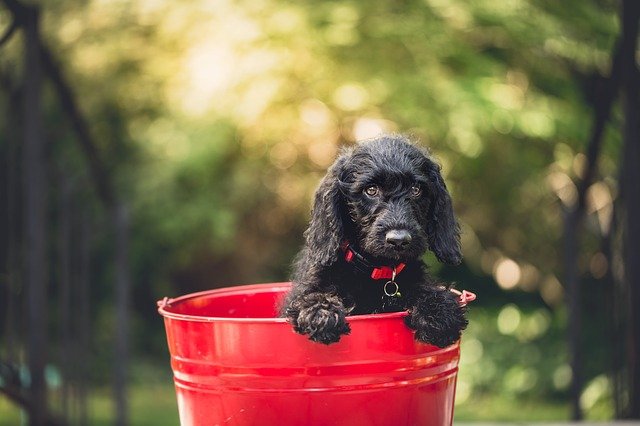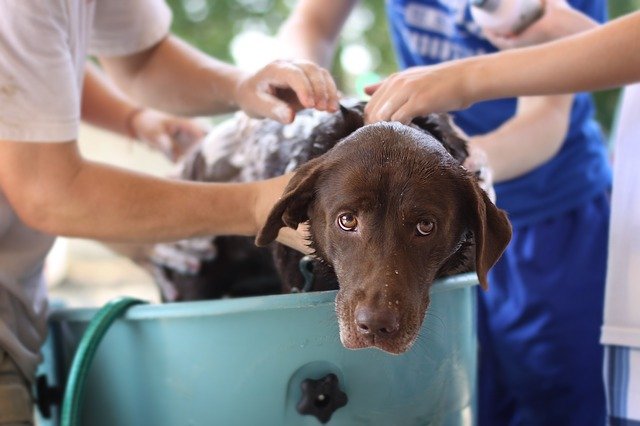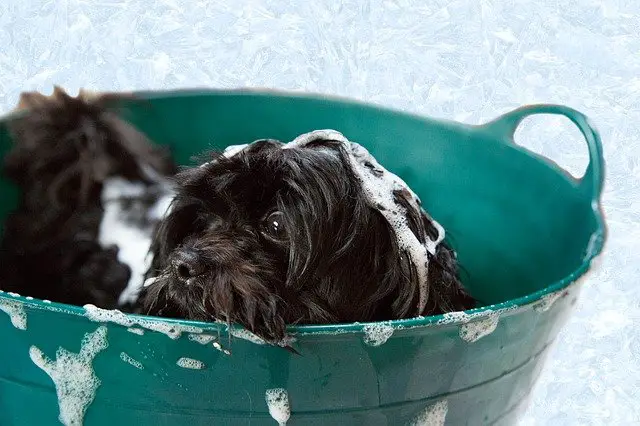Bathing your puppy is a remarkable and surprisingly rewarding experience. However, when it comes to bathing, it is not all fun and games. There are several important considerations – from choosing the right shampoo to preventing soap from getting into the eyes. Another important yet frequently neglected factor is timing.
How soon can I bathe my puppy after birth? The earliest time you can safely bathe your puppy is when it is four weeks old. And even then, unless the bathing is urgent, for example, the pup rolled into poop or something filthy, it is best advised to postpone the first bathing until few months old.
But what if my less than 4-week old puppy gets extremely dirty and bathing is inevitable? Are there exceptions to this rule? And how can I safely bathe a puppy? If you are interested in finding out, keep reading, as this article will explain everything you need to know about bathing puppies and, of course, bathing their proud mommas.
WHEN CAN YOU BATHE A PUPPY AFTER BIRTH?
As a general rule of thumb, newborn puppies should not be bathed while less than four weeks old.
The main reason is that they are incapable of efficiently regulating their body temperatures and can quickly become hypothermic. Hypothermia in young puppies can be a life-threatening condition.
However, as dog parents, we all know filthy and messy situations are part of the dog parenting experience. In those terms, sometimes it might be necessary to bathe your puppy before reaching the one-month milestone.
Fortunately, with extreme care and certain precautions, there is a way of safely bathing and cleaning your newborn puppy.
HOW CAN I BATHE A NEWBORN PUPPY?

Generally speaking, there are two methods of bathing a newborn puppy – modified or minimal cleaning method and classical bathing method.
The minimal cleaning method
- Start by choosing the warmest area of your house where there are no draughts and based on your puppy’s size prepare a towel or cotton balls (alternatively gauze)
- Wet the towel or cotton balls with warm water (if the water is too hot or too cold it can be dangerous for your puppy)
- Start wiping – gently wipe your puppy’s head area and work your way towards the tail. It is important to moist the towel/cotton balls every time the water they soaked becomes cold
- Dry your puppy off – this is the most critical part as you need to makes sure not to leave any damp spots. Usually, it is advisable to remove the superficial moisture with a dry cloth and then use the hairdryer (just make sure it is set on the lowest warmth setting and blow from a safe distance).
The classical bathing method
- Choose a warm and drought-free area
- Fill an adequately sized container with warm water. If the container is too big it will be hard to maintain the water temperature and if it is too small it will make the bathing more challenging and cause delays
- Instead of shampoos use your fingers (or gauze) to remove the dirt mechanically. If shampoo use is inevitable consult with your vet. However, avoid shampooing your puppy completely – use shampoo only for the soiled areas.
- Hold your puppy slightly above the waterline with one hand and scoop water over it with your other hand. Work as fast as you can while ensuring water does not get into the puppy’s face.
- Dry by using dry soft towels and then a hairdryer set on the lowest setting.
Tip: If in addition to being filthy and in need of a bath, your puppy has fleas, use soft-tipped tweezers to catch them and remove them. Keep in mind that most anti-flea products are not suited for puppies less than 8 weeks old.
The general rules
With the two methods, explained it is time to say a word or two about general rules that apply whenever bathing a newborn or young puppy:
- Carefully evaluate the situation and bathe if extremely necessary (unless the puppy is particularly filthy it should not be bathed as its mother takes care of all necessary cleaning)
- If applicable, always opt for spot cleaning instead of bathing
- Puppies have a distinct smell which is not a reason for bathing
- Keep the bathing ritual as short as possible (it helps if you have an assistant and all bathing tools prepared and within reach)
- Never immerse your puppy in water
- Forget about shampoos, your newborn puppy’s skin is too sensitive for chemicals
- If you had to bathe your newborn puppy do not repeat the procedure until it is four weeks old or preferably until few months old.
WHAT TO DO AFTER A DOG GIVES BIRTH?
Even if your momma dog is in desperate need of a bath after giving birth, this is not the time for bathing. Momma dogs are extremely caring and need to attend to their babies’ needs – providing warmth and milk.
Plus, immediately after whelping, the mother dog and her puppies bond with each other through their scents and cuddling.
Organizing the bath to occur during these critical times can affect the puppies’ safety and the bonding process. Plus, separating the mother from her puppies will be too stressful.
However, the body fluids of the whelping are particularly smelly, and sometimes the mother cannot get rid of them completely. In such cases, you can safely bathe the mother between two and five days after giving birth.
Just be mindful of how long you leave the puppies unattended and make sure they are warm while their momma is taking a bath.
HOW DO I WASH MY DOG AFTER GIVING BIRTH?

- Timing is everything, so it is important to start by choosing the perfect time for a bath. Namely, the perfect time would be when the puppies are fed and sleeping. If the mom has already nursed, the bathing will be simpler, too, as there will not be any milk dripping in the bathing water.
- Place your dog in the tub while handling her as gently as possible. It is vital to avoid pressuring her abdomen and mammary glands.
- Use the shower to wet your dog and gently rub her with a mild shampoo formula. The shampooing procedure is the same as usual. The only difference is the pressure you apply while working the belly area.
- Rinse thoroughly. Rinsing is a critical point in every bathing. However, it should be extra thorough when dealing with a nursing mother as you do not want the newborn puppies exposed to shampoo leftovers.
- Dry thoroughly, too. Once again, thorough drying is always recommended, but it is even more important in nursing mommas because if the mother is wet, she will make her puppies wet. As usual, the drying is done with a dry towel and then with a hairdryer.
Note: Keep in mind that momma dogs do not like being separated from their pups and might be nervous during bathing or sad after bathing.
To prevent slipping, put a non-slip mat on the tub’s floor and to prevent escaping, close the bathroom door.
It is also helpful to prepare everything in advance so that the bathing can take as little time as possible.
CAN I BATHE MY DOG BEFORE GIVING BIRTH?

Yes, pregnant dogs can be bathed before giving birth. In fact, bathing prior to giving birth is recommended as it is more hygienic for the puppies. The bathing will remove the debris and dead, lose hairs, thus ensuring a cleaner nursing environment for the puppies.
However, there are few safety guidelines:
- Careful handling and avoiding unnecessary pressure in the abdominal area
- Providing non-slip surfaces by covering the bathroom and tub’s floor with non-slip mats
- Using the right shampoo – is of paramount importance as shampoos get absorbed through the skin and can endanger the puppies. For this purpose, anti-parasitic shampoos are off-limits for pregnant mommies. Even some regular dog shampoos contain ingredients that can be harmful. To choose the right product, talk to your vet.
CONCLUSION
Bathing newborn puppies can be pretty risky, especially if not aware of all safety considerations. However, with some preparation and the presence of a helpful assistant, you can organize the bathing to be as short and efficient as possible.
If you have any concerns regarding bathing – from whether it is necessary to what to expect after, do not hesitate to talk to your trusted vet.
Although there are groomers who bathe dogs for a living, it is not recommended to bring your puppy to the groomer’s salon. Alternatively, you can ask the groomer to come over to your place and give your puppy a quick and
safe bath.
FAQs
Can you bathe 1 week old puppies?
The widely accepted rule is that you should not bathe puppies before four weeks old. However, in extreme situations (uncaring mother or orphaned puppy found in the streets), it might be necessary to bathe a one-week-old puppy. In such cases, special care and safety precautions are imperative.
How often should I bathe my puppy?
There are bathing frequency recommendations based on breed, skin issues, and of course, individual tendencies. However, in ideal circumstances, you should not bathe puppies before few months old and then no more than once per month.
Can puppies take a bath every day?
No, frequent bathing will remove the natural oils from the puppy’s skin and increase its risks of developing skin problems. Not to mention that regular bathing can affect the puppy’s underdeveloped immunity and put it at risk of acquiring infectious diseases.
Can puppies take a bath at night?
As long as you provide a warm bathing environment and ensure your puppy is thoroughly dried after the bathing, the time of day or night in which the bathing takes place does not matter.
Can you bathe a nursing dog?
Yes, you can bathe a nursing dog. Just make sure not to interrupt the nursing session and not keep the mother away from her puppies longer than necessary.
How long after a dog gives birth can she be groomed?
Immediately after giving birth, there are more pressing concerns than bathing. However, after two and five days of giving birth, the proud momma will appreciate a nice but short grooming session.

